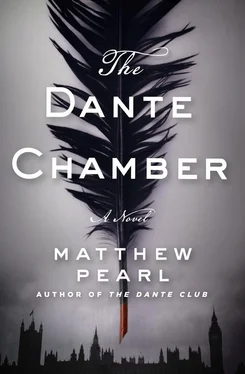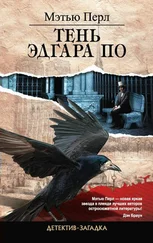“I don’t know exactly how Gabriel came to be there,” Browning finally answered. “But I suppose you know more about our inquiries than you and Inspector Williamson ever let on. You’ve been watching us. First through your own spies entering Tudor House, then Tennyson, now the police vessel on the Thames.”
“You’ve confused inferences for facts, Mr. Browning,” Branagan replied, realizing he sounded like Dolly. “Inspector Williamson had you and Miss Rossetti shadowed when we were searching for Mr. Rossetti’s whereabouts, yes, but no longer. As Inspector Williamson told Mr. Tennyson, we’ve never sent any boats to Tudor House.”
Browning studied him with headstrong skepticism, but found no signs of deception. The train continued to struggle forward for a short time, then halt, nauseating the men. The poet stared at the expanse of white outside the window.
“If that wasn’t your boat hounding us after all... Green is the color of hope, and appears throughout Purgatory . Green...” Glimpses of green had been right in front of their eyes: the handkerchief Reverend Fallow had in his pocket; the streamer flapping on the boat that had been lurking behind Tudor House, below Sibbie’s room; the garments of some residents of the sanatorium, like the wings and garments of the blond-headed, sword-carrying angels who enforced the rules of Purgatory. Browning searched his memories for the first time they saw the vessel on the Thames. It was after they brought Sibbie to Tudor House. Then came the thumping “spirit noises” when the medium was there. The plate of food in the vaults. “The vessel wasn’t there to watch us at all,” Browning continued his realization. “They were watching her , waiting for her . They came in through the underground vaults under Tudor House — the ones that were ages ago used for smuggling — keeping watch on her progress, waiting until Holmes found a way to revive her, so they could take her back. When Fallow visited, he got lost in the house and I had to show him the way out.”
He thought about Fallow’s face that day at Tudor House, could almost see it before him on the train. The impassioned, calculating eyes locking onto him.
Browning continued: “But Fallow wasn’t really lost trying to find a way out — no. He was studying the house for a way in , unlatching doors, all for her.”
“You’re talking about the girl, Fallow’s assistant?” Branagan asked, trying to keep up with the rapid flow of conclusions.
“Sibbie Worthington! We thought Fallow was harboring improper affections for her, but if his minions were lurking there, waiting for her, protecting her, it might be the clue to an entirely different story. Constable, what if she wasn’t serving the preacher at all, and we were blind to the truth — he was serving her. Whatever has happened there, what if she is the true center of it?”
Simon Camp would be roused at odd hours, pulled around by the collar to see some new sight or another he was to chronicle, or to interview someone, or to study a book or documents. The ingenious plans Camp had concocted for escape had so far all remained untested for one particularly inconvenient reason — that class of green-robed fanatics armed with very long, very sharp swords in their belts. He noticed that these guards, oddly enough, all had blond hair. There were usually one and sometimes two armed fiends accompanying him, or guarding a door to his chambers, where he wrote and slept. His activities were mandated and few: mostly, studying Dante or composing his chronicle of the “divine achievements” of his captors, the pages of which were gradually transported to a printer in London. (Camp did not know which, and so hesitated to try to embed any messages asking for help.)
“Do not dwell over the punishments,” Fallow advised him of his writing, “they only last until the final judgment.”
Camp searched his mind, recalling a verse from Purgatory he had just read, in which Dante Alighieri exhorts his poem’s readers: Do not fix your thoughts on the punishments, think of what comes later; at worst it will not reach beyond the great judgment.
Fallow had transported his entire being, his identity, even his language, into Dante’s vision.
There was something comforting in believing that even our faults, especially faults, could be converted into a higher plan. Camp could understand that as well as any man. He considered this only for a flash, cursing his own physical and mental exhaustion.
The latest place Camp was ushered was in a dark and narrow woodshed on the settlement, where one man and one woman, arms and legs tied, had been placed flat on their stomachs. They moaned and cried for mercy; the man pleaded for the Virgin Mary. Camp was less interested in the grotesque suffering of these poor people than in its proximity to the maniacs’ central operations.
That piqued his curiosity.
The earlier deaths were meant to be discovered and witnessed. The unseasonable weather at the moment made travel toward London trying. But the masterminds could have waited, so Camp surmised they must have been in a rush to complete their so-called “missions.” They were being hunted from all sides and knew it — a distraction Camp could use to his advantage if luck provided him even the slightest opportunity for escape.
Back at the standing desk, Camp was composing his latest enforced chapter to the new sensation pamphlet. He wrote about the despair he had just witnessed of the bound and tied pair — styled after the terrace in Dante’s Purgatory cleansing humanity’s sins of the Avaricious and the Prodigal. As he worked on the chapter, he perked up to hear the agitated voice of the Great Mad Preacher. Since the return of the woman called Sibbie, the minister’s demeanor had cracked and curdled. He struggled to maintain the semblance of authority. Camp had not yet spoken to Sibbie — instead he had heard about her from Fallow and the other interview subjects he was given, and had observed her from afar.
That was about to change.
Sibbie swept into the chamber and walked right up to Camp. “This,” she said with undisguised contempt, “is the one you’re talking about?”
“The work he does will be vital, and he has just the right experience for it,” Fallow said, trying to keep pace with her while maintaining a respectful distance. “Sibbie, he is the author of that very booklet of Dante phenomena that helped us stir the imaginations of so many, that brought them to Dante in the first place.”
Sibbie grabbed the pages on top of Camp’s blotter and examined them with a tightly set jaw.
Fallow gave a conspiratorial glance of support to Camp, as though they were allies — which perhaps for this very brief moment they were, more than Camp realized. “Sibbie, we have already begun to put this chronicle in type. When our full story emerges, so will the next epoch for what we are to achieve.”
She began to respond, when they were interrupted by an unannounced visitor. Once again it was the imposing Ironhead Herman.
“Well! She is finally back,” the swarthy visitor said without pausing for any greetings or trying to quiet his voice. “Just as I heard. Which means my time to collect has come.”
“You heard? How?” Fallow inserted himself between Herman and Sibbie. “She’s only just returned, Brother Herman. We need some more time to put our affairs and our mission in order, to recruit more men and women and replenish our funds.”
“I made certain you were amply supplied with what you needed for your so-called sanatorium, and my patience, and that of the superiors I answer to, is a good deal shorter than you seem to believe.”
Camp interrupted. “Say, fellow,” he said, turning to Herman, “perhaps you would allow me to ask some questions for the chronicle I’m writing?”
Читать дальше












